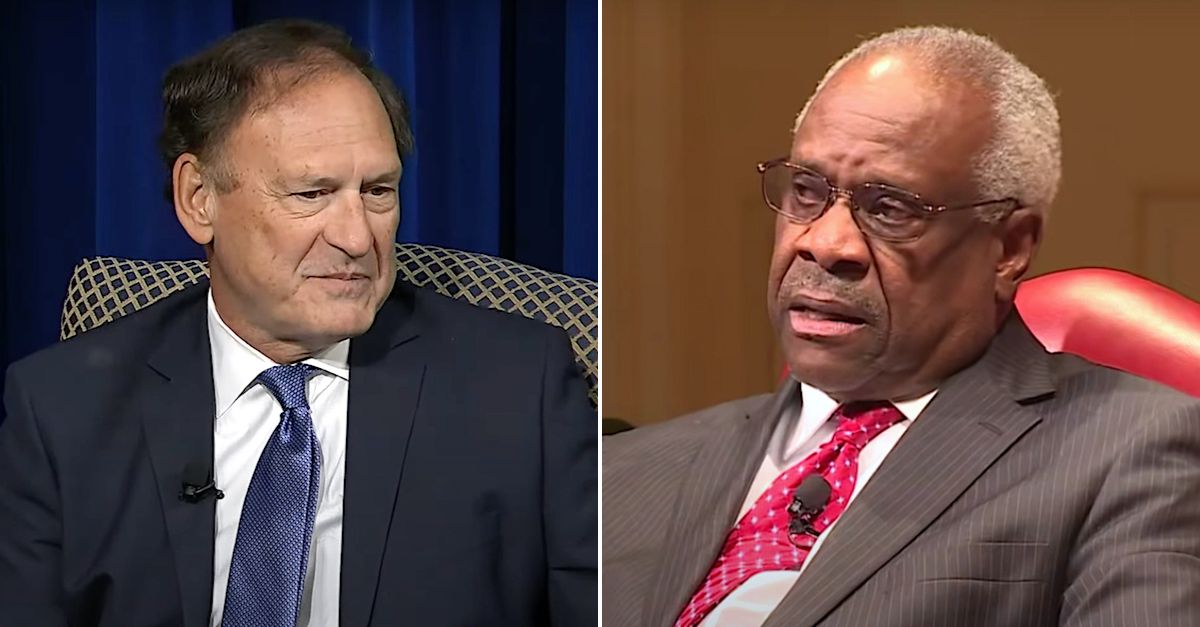
Left, Associate Justice of the Supreme Court Samuel Alito. (Image via YouTube screengrab/The Heritage Foundation.) Right, Associate Justice of the Supreme Court Clarence Thomas.
(Image via YouTube/Library of Congress.)
Three conservative justices said Monday that the U.S. Supreme Court should have taken up the case of a Christian counselor challenging the state of Washington’s ban on “conversion therapy” for minors. While Justice Brett Kavanaugh noted he would have granted the petition for a writ of certiorari but didn’t write why, Justices Clarence Thomas and Samuel Alito both wrote dissents elaborating on their position.
In a March petition, which was rejected Monday, the Alliance Defending Freedom, a conservative legal group that “advances the God-given right to live and speak the Truth […] in law, policy, and the public square,” identified Brian Tingley as a “practicing Christian” and “licensed marriage and family counselor who helps clients with various issues, including sexuality and gender identity.”
Tingley presented the Supreme Court two questions to answer, including one asking if it’s a First Amendment violation to “censor Tingley’s conversations with clients”:
1. Whether a law that censors conversations between counselors and clients as “unprofessional conduct” violates the Free Speech Clause.
2. Whether a law that primarily burdens religious speech is neutral and generally applicable, and if so, whether the Court should overrule Employment Division v. Smith, 494 U.S. 872 (1990).
Tingley’s petition said that the counselor “grounds human identity in God’s design rather than a person’s feelings or wishes” and that many clients choose him “because they want to align their identity with their faith,” but Washington law barring “a regime that seeks to change an individual’s sexual orientation or gender identity” stands in the way.
The petitioner said Washington “censors” him by “prohibit[ing] any conversations that might encourage ‘change [of] an individual’s sexual orientation or gender identity,’ while allowing conversations that ‘support … identity exploration’ and ‘do not seek to change sexual orientation or gender identity.””
Justice Thomas, for his part, wrote Tingley’s petition for a writ of certiorari after the U.S. Court of Appeals for the Ninth Circuit’s decision should have been granted by SCOTUS because the case “strikes at the heart of the First Amendment” and touches on the “fierce public debate over how best to help minors with gender dysphoria.”
“This petition asks us to consider whether Washington can censor counselors who help minors accept their biological sex,” Thomas began his dissent of the case denial.
Justice Thomas, writing there was “little question” the challenged law “regulates speech and therefore implicates the First Amendment,” concluded that the law amounted to “viewpoint-based and content-based discrimination in its purest form,” not simply a regulation of the “practice of medicine”:
Under SB 5722, licensed counselors can speak with minors about gender dysphoria, but only if they convey the state-approved message of encouraging minors to explore their gender identities. Expressing any other message is forbidden — even if the counselor’s clients ask for help to accept their biological sex. That is viewpoint-based and content-based discrimination in its purest form. As a result, SB 5722 is presumptively unconstitutional, and the state must show that it can survive strict scrutiny before enforcing it.
Doubting that Tingley’s case “will be the last” of its kind to arise from the Ninth Circuit or elsewhere, Thomas wrote that the Supreme Court should have settled the First Amendment question in the coming months.
“Yet, under SB 5722, licensed counselors cannot voice anything other than the state-approved opinion on minors with gender dysphoria without facing punishment. The Ninth Circuit set a troubling precedent by condoning this regime,” Thomas said. “Although the Court declines to take this particular case, I have no doubt that the issue it presents will come before the Court again. When it does, the Court should do what it should have done here: grant certiorari to consider what the First Amendment requires.”
Justice Alito was in agreement with Thomas that Tingley case “presents a question of national importance.”
“In recent years, 20 States and the District of Columbia have adopted laws prohibiting or restricting the practice of conversion therapy. It is beyond dispute that these laws restrict speech, and all restrictions on speech merit careful scrutiny,” Alito said in a shorter dissent, noting the “conflict in the Circuits about the constitutionality of such laws.”
Have a tip we should know? [email protected]

